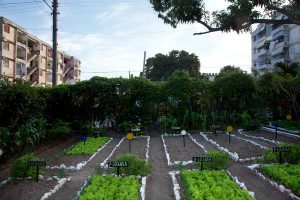 The enormous ecological footprint of large scale food production, particularly as a direct result of petroleum energy inputs stands out as the biggest deterrent to a sustainable food system. In order to generate the highest yields, factory farms are intrinsically dependent on oil, from the equipment required to cultivate and harvest, to the necessity for soil amendments that promote the increased production. Those synthetic nitrogen based fertilizers require dizzying amounts of fossil fuel to produce, but according to Michael Pollan, only one fifth of the energy used for producing food is used in farming practices. The other four fifths are burned in transportation and food processing. (Little P15). As Amanda Little points out one study concludes that, “Americans emit more greenhouse gasses eating than driving” (P.3)
The enormous ecological footprint of large scale food production, particularly as a direct result of petroleum energy inputs stands out as the biggest deterrent to a sustainable food system. In order to generate the highest yields, factory farms are intrinsically dependent on oil, from the equipment required to cultivate and harvest, to the necessity for soil amendments that promote the increased production. Those synthetic nitrogen based fertilizers require dizzying amounts of fossil fuel to produce, but according to Michael Pollan, only one fifth of the energy used for producing food is used in farming practices. The other four fifths are burned in transportation and food processing. (Little P15). As Amanda Little points out one study concludes that, “Americans emit more greenhouse gasses eating than driving” (P.3)
The fertilizers themselves are kind of schizophrenic cocktail, giving life to some and taking it from others. On one hand they’re like colostrum for the plants that will absorb them from the ground and eventually become sustenance for millions of people. On the other, from an environmental impact perspective they are a toxic brew for the marine ecosystems downstream. As they leach into groundwater and runoff into drainages, they eventually find their way to estuaries and bays like the Chesapeake and the Gulf of Mexico causing so called “dead zones” where the oxygen depleted water can no longer support life.
Refreshingly but perhaps frightening for some, Cuba provides a test tube kind of look at a better way to produce food. That is to say if better means that agriculture is predominantly oil independent, promotes reliance on the natural cycle of soil regeneration, produces food close to or in the communities where it will be eaten, encourages biodiversity and supplies foods proven not to cause obesity and diabetes. The trade off is, as Amanda Little humbly admitted that something has to give, and that will likely affect more than our lifestyles and creature comforts. If oil is sustenance for now, we will be forced to adapt, as the Cuban people have as the resource becomes increasingly scarce. Maybe when that adaptation happens, they will share their knowledge with us.
Photo Source:
Friedman-Rudovsky, Noah. Urban Agriculture In Cuba, Nacla, http://nacla.org/news/2012/10/18/urban-agriculture-cuba-photo-essay, Website

Perhaps one day we will develop GM crops that don’t need to rely on the nitrogen cycle. The nitrogen cycle is simple yet complex and like you said sucks up a lot of fossil fuels. The nitrogen cycle works on a basis of mutuality between plants, bacteria and organic matter. It starts with fixation; a process by which bacteria convert nitrogen into ammonium. Later, ammonium is converted into nitrates; a process known as nitrification. Nitrates are what plants can readily absorb, although there are some plants that can directly absorb ammonium. When a plant or animal dies bacteria turn the nitrogen back into ammonium; therefore back into the cycle. Without nitrogen plants cannot exist, it is vital for their cells to function and perform. Without nitrogen in the soil species of legumes would not be able synthesize other nutrients that are essential for their way of life and growth.